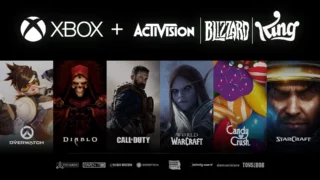Microsoft’s Activision Blizzard deal ‘could be on a collision course with lawmakers’
But it’s believed the deal will likely go through, according to a tech investment exec

Microsoft’s acquisition of Activision Blizzard could be on a “collision course” with lawmakers in Washington DC, an expert has claimed.
Gene Munster, founder of tech investment firm Loup, appeared on CNBC’s Squawk Box on Tuesday to discuss the breaking industry announcement, and suggested there may be a legal battle to follow before the deal is done.
Host Joe Kernan pointed out that despite Microsoft announcing that it was going to buy every Activision Blizzard share for $95 each, the share price was still staying around $89, and asked Munster why nobody was buying despite what appeared to be a ‘guaranteed’ $6 per share.
Munster replied by suggesting there was a conflict on the table, because Washington lawmakers have previously stated that they want to have greater control over corporate monopolies and this deal appears to go against that.
Just last Summer, President Biden signed an executive order promoting competition in the US economy which specifically called out Big Tech companies.
“The title of this episode [should be] Silicon Valley / DC Collision Course,” Munster said, “because effectively what Microsoft and Activision are doing is saying ‘we don’t buy it DC, we don’t buy that you want to create greater control around these companies, we don’t believe that you ultimately want to break up these companies’.
“And so I think that is the disconnect, is this seemingly flaunting by Microsoft about everything we’ve heard from Washington.”
He added: “I suspect that the legal advice and the banking advice that Microsoft and Activision have here is top shelf, no doubt, and so I think if DC doesn’t stand up and do something here, [then you] fast forward one, two years down the road and they start talking about greater regulation, I think most people won’t buy it, most companies won’t believe that they’re actually going to take control.
“And so I think that’s the disconnect, is this is really setting up for some good drama here around how this plays out.”
However, Munster concluded that, in his view, the acquisition would still go ahead despite the potential government conflict.
“In the end the deal gets done,” he predicted, “and part of the reason is I think a lot of the sabre-rattling that we’ve heard from Capitol Hill in the past two years, I think it’s been off-base, and specifically it’s been anchored in this belief of doing what’s best for the consumer.
“In the end, these big tech companies – despite, I think, frustration from many about the kind of wealth that they’ve created for themselves – I think that they are ultimately making consumers’ lives better
“And I think that you can debate the profitability side of this, but I think it [will actually happen] because I think in the end DC doesn’t have the ground to stand on to ultimately block this.”

Microsoft’s Activision Blizzard acquisition is expected to close during the company’s fiscal year 2023, which ends next summer, it said on Tuesday.
The transaction has been approved by the boards of directors of both Microsoft and Activision Blizzard. However, it’s still subject to closing conditions and completion of regulatory review.
Notably, the deal will need to clear the scrutiny of the United States and the European Union’s antitrust regulations.
Competition law seeks to maintain market competition by regulating anti-competitive conduct by companies. In the case of mergers and acquisitions, regulators can prohibit deals which are considered to threaten market competition, or suggest remedies such as an obligation to divest part of the new business.
In the last decade, the EU blocked a proposed merger between Dutch logistics company TNT and American rival UPS, as well as a the proposed takeover of Aer Lingus by Ryanair.
However, Microsoft’s $7.5 billion acquisition of Bethesda parent Zenimax was cleared without concessions in March 2021, leading to the deal’s completion.














